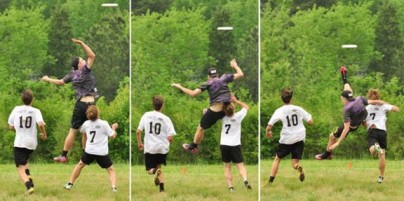What really is a spirit foul? As a high school assistant coach at this year’s Georgia State Tournament, I thought I knew. Maybe now I know better. Maybe I should have known better that Spirit of the Game (SOTG) starts with me and with my team, before it shows up anywhere else.
USA Ultimate had done its part. They had sent spirit award wooden discs. If I thought about spirit at all, it was that my team showed good team-spirit toward each other. That’s different though. Hardly an example of the lofty expectation of respect or sportsmanship embedded in SOTG. Since there was not an external prompt about keeping spirit scores, if I thought about spirit at all, it was more of social spirit than SOTG. To new players and even some elites though, it’s treated as a cutesy afterthought or an eye-rolling joke.
What I had not realized is that an absence of SOTG could lead to actual fouls which could lead to actual injuries. New players, especially players who migrated over from contact sports, may miss that contact. To those familiar with closely guarding an opponent, and touching while marking, sometimes ultimate may seem like there’s too much complaining, too much blathering. Just play. Stop crying and whining about the ticky-tacky fouls. No blood—no foul.

After tearing his ACL in a Georgia state tournament game, Vasia Mishin is helped off the field as Lakeside teammates look on. (Photo by Rob Brownell)
Don’t hurt the dirt
When the field venue called day two off because of the threat of rain, coaches and organizers scrambled early Sunday . Fast calls and rapid Facebook postings arranged for an out-of-town, rural set of school district fields to resume tournament play.
The new venues were far from ideal: No restrooms at some fields; No water; Not even time to set up tents. When four teams’ worth of players and parents arrived at a field barely big enough for one game, a quick multi-team meeting assembled just off the pitch in the wet, unmowed grass. Gripes and questions ensued.
The dean of Georgia high school coaches, Paideia’s Michael Baccarini, addressed the teams and families. With just the right mix of smile and earnestness he re-framed the situation, “Hey this is just like the old days of Ultimate.” He pointed at the pitch and said, “We’d have state tournaments in cow pastures worst than this where the hay was so high you couldn’t even see the cones. Don’t worry, it will get tromped down soon enough!”
During the buzz, with logistics and weather to worry about, not to mention opponents and personal performance, teams piled back into cars and sped off to nearby schools and fields. Spirit was the last thing any of us were thinking about.
It starts with whom?
Experienced teams and coaches had an expectation of SOTG and for the most part that’s the way it was played. Most teams followed the letter of the law, if not the spirit, and by custom, played with a high level respect and care to avoid injuries. Still, the weather and game scores were all that was tracked.
The trouble in a lot of sports is when the social contract breaks down. That’s when the agreement between teams that sportsmanship will prevail, and it will all be good clean fun leaves the field of play. When it becomes win or die, SOTG has a hard time staying viable.
Ultimate writer Aaron Cutbirth posted in an article on Yahoo!, “Good sportsmanship and ultimate respect also lead to almost no instances of fighting and taunting [in Ultimate]. Those who choose to taunt the opposition in Ultimate are usually discouraged by their team and often receive a ‘spirit foul’ from the other team or even their own captain.”
Unlike fighting in other team sports, e.g. hockey fighting, intentional fouling in basketball, or football fans tearing down goal posts, ultimate thrives on resolving conflict amicably. Players, coaches and fans have to hash it out. Sometimes that’s not pretty either. Looks like haggling or just arguing on the field. A conversation is how SOTG actually looks. But to outsiders, it may just look like stoppage.
Foul! Contest
It takes time to agree or to even to disagree. Stoppage time. How those agreements and disagreements get handled should impact a team’s spirit score. Still, each team or captain has to take the time to reflect on themselves first and then the opponent during the a foul call, and how that impacts a spirit score. Ultimately scoring spirit points might be the best way to keep a game from going lame.
The finals were played later in the week, after the weather and frustrations had settled. Nobody said much about the absence of spirit scoring.
After battling back in the quarter-final game against Lakeside, Woodward Academy’s momentum and come from behind points run turned on a contested catch/drop call. It was close. The coaches of the Woodward Academy team showed gritty intensity but stoic acceptance of the play that could have gone either way. Despite the contested focus of the final point, and clearly feeling upset about the outcome, Woodward coaches and players demonstrated respectful acceptance. An unofficial SOTG first-runner up award winner.
In the final, Paideia prevailed, handily winning the championship over Lakeside with crisp, possession-handling and patient defense. The Paideia Gruel’s SOTG kept it high-spirited too: good clean fun–ultimate essence in cooperative play. Very classy, and, in my eyes, clearly the unofficial spirit award winner.
Spirit-wise, next year’s Georgia state tournament will be different. There will be more spirit-infused play to elevate the games. And there will be spirit scoring too. If nothing else to keep us all at the top of our game.

Danny Stevenson is up-ended in a contested foul at the Georgia state tournament. (Photo by Rob Brownell)
Feature photo by Christina Schmidt – UltiPhotos.com







Comments Policy: At Skyd, we value all legitimate contributions to the discussion of ultimate. However, please ensure your input is respectful. Hateful, slanderous, or disrespectful comments will be deleted. For grammatical, factual, and typographic errors, instead of leaving a comment, please e-mail our editors directly at editors [at] skydmagazine.com.